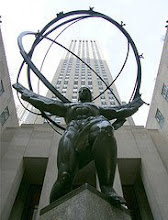 A few nights ago I dreamt a very revealing dream, one that drew attention to the irrational nature of my being.
A few nights ago I dreamt a very revealing dream, one that drew attention to the irrational nature of my being.It was beyond bizarre, this dream. I’d decided to run for Vice President of the United States, a procedural impossibility for more than a few reasons: I a) boasted zero experience (local or national) in public office, b) was running at my current age of 25, which disqualified me on account of my being ten years too young for the position in question, c) had no campaign money and d) was running for an office that one cannot run for. One must be nominated by his or her political party.
Owing to a sitcomish series of events, Elwood advanced thru a few primary-like things without encountering formidable opposition of any kind. Suddenly, inexplicably, only one man remained between me and the veep chair. Nationwide polls showed me leading this dude by a very slim margin (52 to 48) hours before the final votes were to be cast. The Vice Presidency was all but mine! Oddly, I remember no debates, no public appearances, no television spots, no self-promotion of any kind. People kept voting me thru to the next round, and I couldn’t for the life of me figure why. I think I was still living in Brooklyn, just hanging out.
 Here’s where things got weird. I recall a sudden, distinct urge to get the hell outta Dodge and forego the rest of my run. I realized--in a moment of panic--that I wasn’t cut out for the job, but my reasoning was completely ass-backwards. Rather than concede the obvious, blinding truth (that my political non-experience rendered me useless in high public office), I decided that I didn’t want to purchase a new suit and participate in debates and whatnot (in the flawed universe within my dream, the Vice President apparently debates after securing his post). That was my reasoning.
Here’s where things got weird. I recall a sudden, distinct urge to get the hell outta Dodge and forego the rest of my run. I realized--in a moment of panic--that I wasn’t cut out for the job, but my reasoning was completely ass-backwards. Rather than concede the obvious, blinding truth (that my political non-experience rendered me useless in high public office), I decided that I didn’t want to purchase a new suit and participate in debates and whatnot (in the flawed universe within my dream, the Vice President apparently debates after securing his post). That was my reasoning. In other words, my fears were juvenile and utterly baseless. It's kinda like being afraid of spaghetti because someone mugged you once while you vacationed in Rome. In this dream, I was fully prepared to piss away my political dreams for something so petty as a wardrobe upgrade.
 Well, that’s not entirely true. I suppose my most prescient fear was one I suffer from in real life: the fear of public speaking. There are few things which frighten me more than a lone, naked microphone turned away from three or four hundred expectant faces (an aside: Jerry Seinfeld once pointed out that, “According to most studies, people’s number one fear is public speaking. Number two is death. Death is number two. Does that sound right? This means the average person, if you go to a funeral, you’re better off in the casket than giving the eulogy.”). The sudden realization that one of my duties as Vice President would be to speak in public settings--under America’s scrutinous eyeball--proved too much for me.
Well, that’s not entirely true. I suppose my most prescient fear was one I suffer from in real life: the fear of public speaking. There are few things which frighten me more than a lone, naked microphone turned away from three or four hundred expectant faces (an aside: Jerry Seinfeld once pointed out that, “According to most studies, people’s number one fear is public speaking. Number two is death. Death is number two. Does that sound right? This means the average person, if you go to a funeral, you’re better off in the casket than giving the eulogy.”). The sudden realization that one of my duties as Vice President would be to speak in public settings--under America’s scrutinous eyeball--proved too much for me. My dream reinstated something I’ve known for years; time and again I allow my fears to get the best of me, preventing me from taking definitive action. As a case in point, I’ve actually shied from jobs and social situations that might require me to get up in front of people. This cowardice shames me. Fears are to be isolated and conquered, not reinforced.
 It’s one aspect of my being, however, that I’m determined to change. This dream woke me up (both literally and figuratively) and slapped me around a bit. Life’s too short to allow for the influence of unfounded fears.
It’s one aspect of my being, however, that I’m determined to change. This dream woke me up (both literally and figuratively) and slapped me around a bit. Life’s too short to allow for the influence of unfounded fears. A dream analyst would probably have something to say about me running for Vice President rather than going for the whole enchilada, too, but that’s a post for another day.
...


















